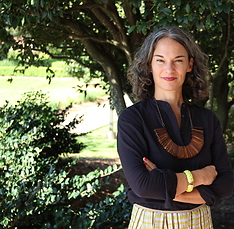Rebecca Snedeker
The L’Union Creole Spring Concert Series: Love and Life on the Cornerstore Dancefloor
In 2018, four organizations in New Orleans collaborated to create L’Union Creole, an oral history and concert series, and book and album. On Sunday evenings,once a month from January to May, different New Orleans-based bands played at the Neighborhood Story Project cornerstore space in the 7th Ward. Each evening began with greetings from curator Bruce Sunpie Barnes, followed by interviews of the musiciansby NSP director Rachel Breunlin and a two-set performance. Presenting groups, including the Neighborhood Story Project, New Orleans Center for the Gulf South at Tulane, New Orleans Jazz National Historic Park, and Preservation Hall Foundation, hoped to createa welcoming space for guests to listen, dance, and pass a good time and for musicians to tune into one another and their surroundings. Another motive was to foreground young, female, and/or queer instrumentalists in the mestís with established cis male figuresin the New Orleans music canon. From 15 ensembles recorded, over 70 gigging musicians represent an array of voices, technologies, and geographies. Their musical languages cross and transcend genre, from spirituals, opera, blues, traditional jazz, brass, r&b,soul, bounce, zydeco, and country, to rara and merengue. With the onset of the pandemic, the 2020 season was postponed and later completed. And in fall 2021, Hurricane Ida damaged the space, closing the series.
By placing this constellation of musicians and audiences—arguably a contemporary, auditory Creolité—in the context of the Plantationocene and climate migration,this presentation will demonstrate how patterns of patriarchal racial capitalist human and planetary extraction and tourism play out alongside the invaluable joie de vivre and healing that can blossom in song. The intimate concert series reveals an imperiledcity that still holds camaraderie and collaboration in the pocket, from which love and life can still untuck and unwind on the cornerstore dancefloor. Where we can ask ourselves: How can we hear our planetary future?
 Rebecca Snedeker is the James H. Clark Executive Director of the New OrleansCenter for the Gulf South at Tulane University (NOCGS), where she supports research, teaching, and programming that focus on New Orleans and the Gulf South and this region’s relationship to the world. Snedekeris inspired by a belief in human rights and the rights of nature, the Gulf South region and place-based learning, and storytelling that weaves multiple perspectives and practices. Throughprojects like the Annual Tulane Gulf South Indigenous Studies Symposium and Anthropocene River Campus, a collaboration with the Haus der Kulturen der Welt (HKW) and the Max Planck Institute for the History of Science, Snedeker co-designs immersive andtransdisciplinary experiences that are grounded in our surroundings and relate the local to the global.
Rebecca Snedeker is the James H. Clark Executive Director of the New OrleansCenter for the Gulf South at Tulane University (NOCGS), where she supports research, teaching, and programming that focus on New Orleans and the Gulf South and this region’s relationship to the world. Snedekeris inspired by a belief in human rights and the rights of nature, the Gulf South region and place-based learning, and storytelling that weaves multiple perspectives and practices. Throughprojects like the Annual Tulane Gulf South Indigenous Studies Symposium and Anthropocene River Campus, a collaboration with the Haus der Kulturen der Welt (HKW) and the Max Planck Institute for the History of Science, Snedeker co-designs immersive andtransdisciplinary experiences that are grounded in our surroundings and relate the local to the global.
Prior to working at Tulane, Snedeker cultivated a body of creative non-fiction work based in New Orleans, co-authoring Unfathomable City: A New OrleansAtlas (University of California Press, 2013) with Rebecca Solnit, and producing several feature documentary films, including Land of Opportunity (ARTE France, 2010), Witness: Katrina (National Geographic Channel, 2010), and By InvitationOnly (PBS, 2007), among others. She graduated from Wesleyan University with a focus on Painting and Art History, and her work has been featured in the New York Times; O, the Oprah Magazine; Orion; Utne; and the Wall Street Journal. Snedeker serves on AdvisoryCouncils for BOMB Magazine and Villa Albertine, and she is the recipient of an Emmy Award and grants from the National Endowment for the Arts and the National Endowment for the Humanities.
